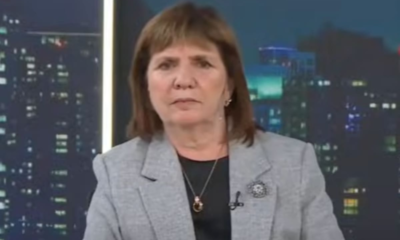INTERNACIONAL
La otra batalla de Benjamin Netanyahu: que Donald Trump se sume a su guerra contra Irán

INTERNACIONAL
Trump administration releases over $6B in frozen education funds to the states
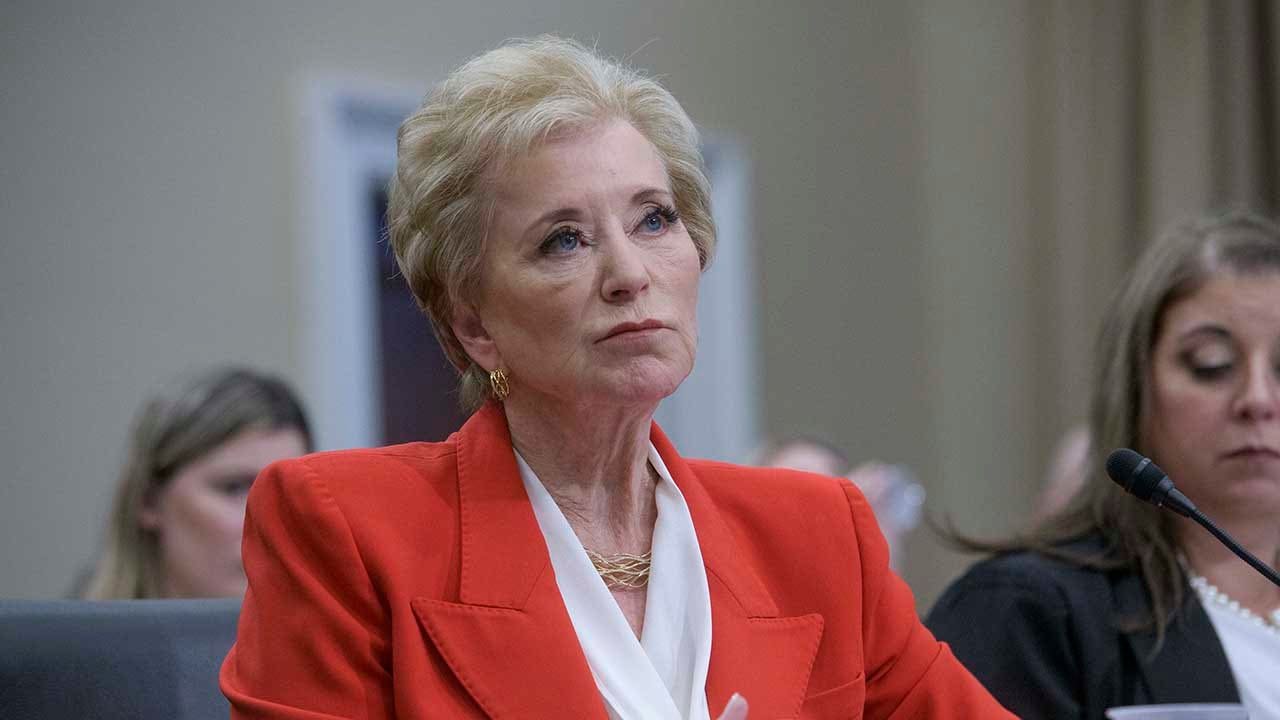
NEWYou can now listen to Fox News articles!
The Trump administration is releasing roughly $6.8 billion in previously frozen federal funds for K-12 programs, the Department of Education announced Friday. The announcement was made as Secretary Linda McMahon attended the National Governors Association (NGA) Summer Meeting in Colorado Springs, Colorado.
The Office of Management and Budget (OMB) «has completed its review of Title I-C, Title II-A, Title III-A and Title IV-A ESEA funds and Title II WIOA funds and has directed the Department to release all formula funds. The agency will begin dispersing funds to states next week,» department spokesperson Madi Biedermann told Fox News Digital.
More than 20 Democratic attorneys general sued the Trump administration earlier this month, describing the Department of Education’s federal funding freeze as unconstitutional and «debilitating» to states just weeks ahead of a new school year.
The bipartisan group of governors, including the NGA’s outgoing chair, Gov. Jared Polis of Colorado, and its vice chair, Gov. Kevin Stitt of Oklahoma, thanked McMahon for unlocking the funding during the NGA’s education session Friday.
DEMOCRAT AGS SUE TRUMP FOR ‘UNCONSCIONABLE’ FREEZE ON $6.8B IN K-12 SPENDING
Secretary of Education Linda McMahon testifies at a House Committee on Appropriations subcommittee budget hearing on the Department of Education on Capitol Hill May 21, 2025, in Washington. (AP Photo/Rod Lamkey, Jr.)
«How can we better communicate to make sure that this chaos and uncertainty doesn’t occur again around funding and that people know things earlier?» Polis asked McMahon on the Colorado Springs stage.
«No guarantees from me that we will eliminate all the communications gaps that do happen, but I can say that part of it is just the transition aspect,» McMahon explained.
The education secretary said the other aspect of the federal funding freeze was that the OMB budget office «took some time to really review the title funding to look at all the programs, etc., before they were released. They were well satisfied. So, now, those funds are going to be going out.»
TRUMP ADMIN SEEKING TO PULL FUNDING FROM LOCAL GOVERNMENTS SLAPPED WITH JUDGE’S PRELIMINARY INJUNCTION
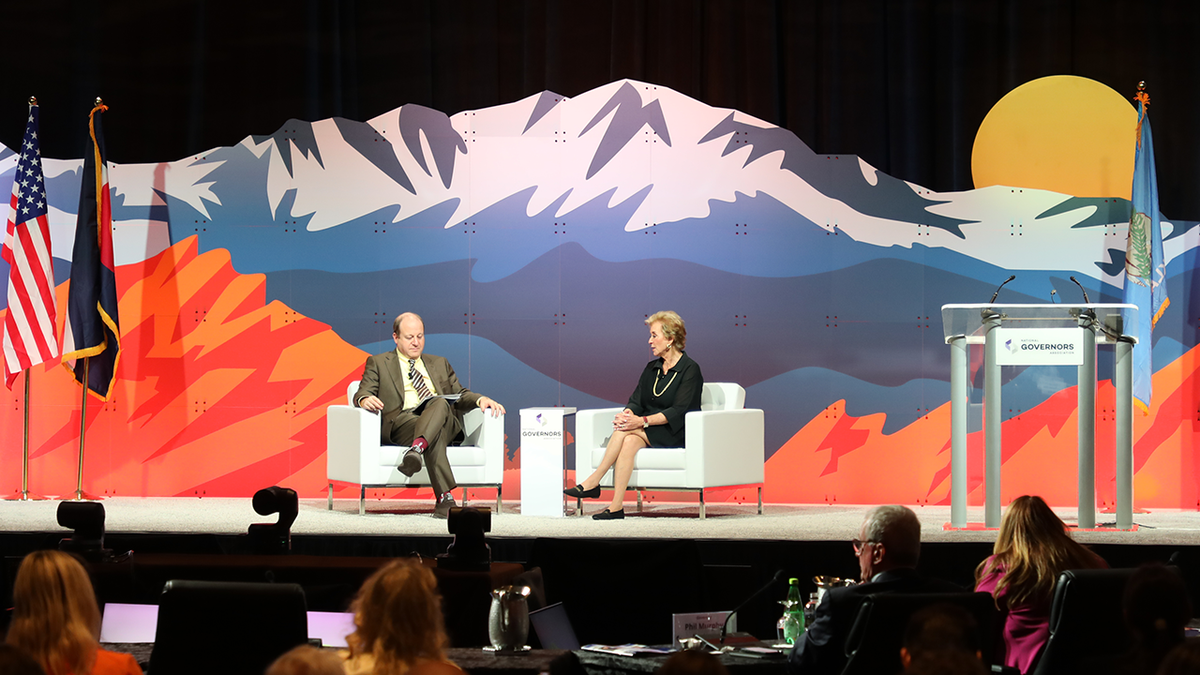
Colorado Gov. Jared Polis, the National Governors Association’s outgoing chair, discusses American education with Education Secretary Linda McMahon at the NGA Summer meeting in Colorado Springs, Colo., Friday, July 25, 2025. (Deirdre Heavey/Fox News Digital)
McMahon assured the governors that now that they have reviewed title funding and gone through the process, «we wouldn’t find ourselves in the same situation.»
Several of the governors who attended Polis and McMahon’s education discussion and had the opportunity to ask questions thanked the education leader for returning the federal title funds to the states.
Polis kicked off the NGA’s summer session in Colorado Springs Friday with his signature policy agenda, «Let’s Get Ready! Educating All Americans for Success.»
EDUCATION SECRETARY LINDA MCMAHON TOUTS COLUMBIA UNIVERSITY’S $200M SETTLEMENT ‘TEMPLATE’
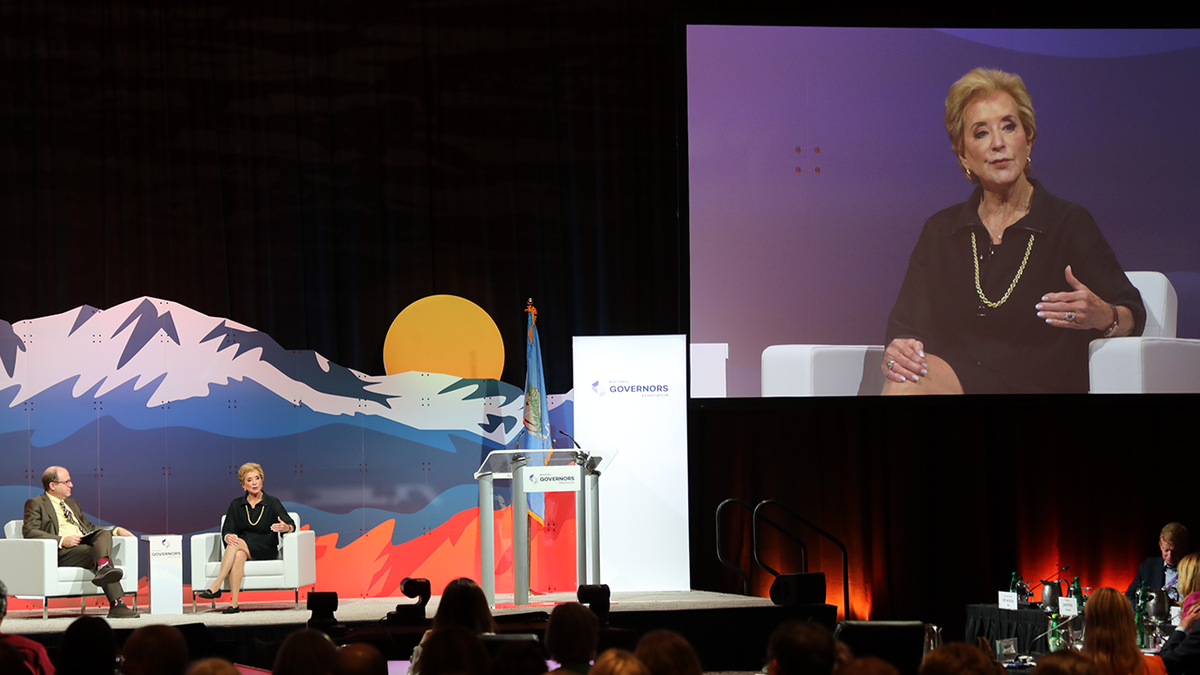
Education Secretary Linda McMahon delivers remarks at the National Governors Association summer meeting in Colorado Springs, Colo., Friday, July 25. (Deirdre Heavey/Fox News Digital)
McMahon said she was appreciative of the governors’ questions and comments, and she committed to visiting as many states and speaking with as many governors as possible to grasp the full scope of the country’s diverse educational needs.
Polis and Stitt said in a joint statement released by NGA that they are «thankful these bipartisan discussions with Secretary McMahon and other key officials during the NGA Summer Meeting led to the distribution of these education funds.»
«This action ensures schools across the nation can maintain essential programs for English language learners, teacher training, and student enrichment as the new academic year begins,» the NGA leaders said, emphasizing that «governors from both parties stand united in prioritizing our children’s education, and we’re proud our advocacy helped secure this vital support for states and districts.»
In an exclusive interview with Fox News Digital ahead of her remarks, McMahon affirmed her commitment to collaborating with governors as the Trump administration seeks to dismantle the Department of Education.
«It’s just incredibly important that if we are going to return education to the states, we have to talk to the governors,» McMahon said.
«Clearly, education is a nonpartisan issue,» McMahon added. «If we’re going to return education to the states, that just means giving them back the part that is now provided by the federal government, and they’re anxious for it.»
CLICK HERE TO GET THE FOX NEWS APP
Trump signed an executive order earlier this year to dismantle the Department of Education, fulfilling one of his key campaign promises during the 2024 presidential election.
Fox News Digital’s Breanne Deppisch contributed to this report.
INTERNACIONAL
Europeans meet with Iranian officials face-to-face for first time since Israel, US bombings as sanctions loom
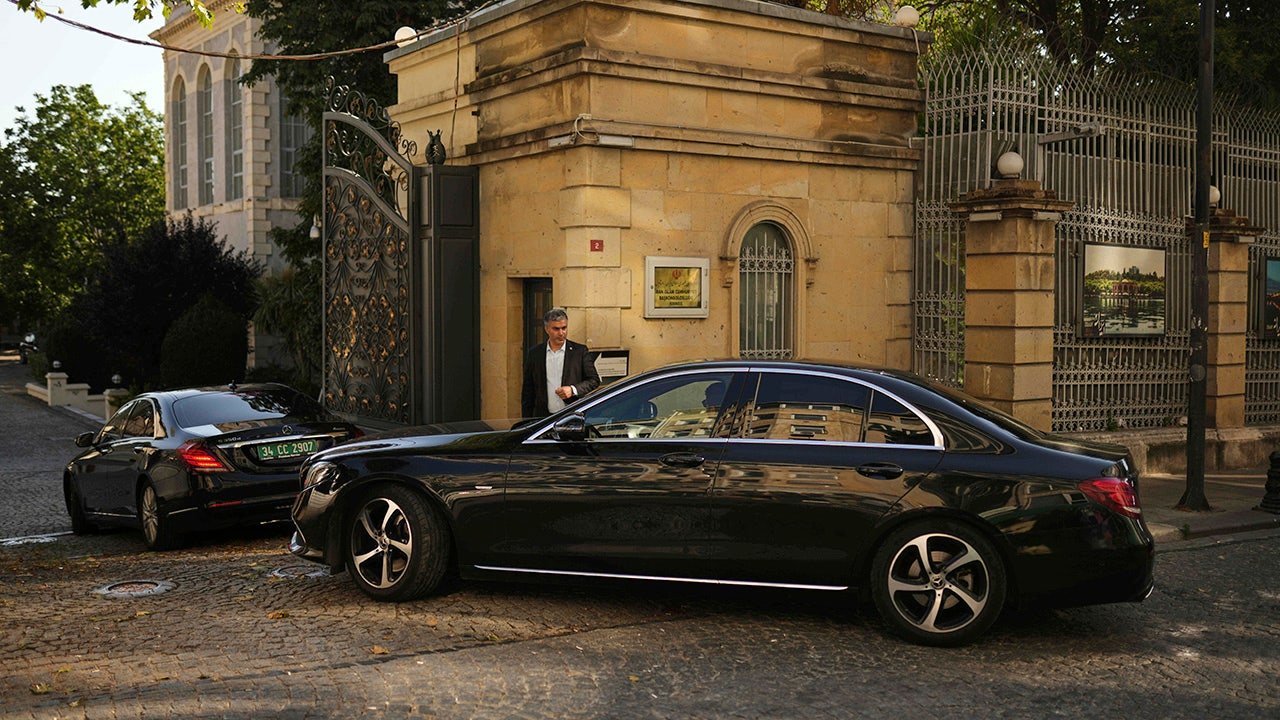
NEWYou can now listen to Fox News articles!
European diplomats met with Iranians on Friday face-to-face for the first time since Israel and the U.S. bombed the country last month.
The «serious, frank and detailed» meeting in Istanbul, Turkey, lasted for around four hours and the officials all agreed to meet again for continued negotiations on Iran’s nuclear program.
Sanctions that were lifted on Iran in 2015 after it agreed to restrictions and monitoring of its nuclear program could be reimposed if Iran doesn’t comply with requirements.
One of Europe’s E3 nations – Britain, France and Germany, who held the talks with Iran – could bring back sanctions under the «snapback» mechanism, which allows one of the European countries to bring back U.N. sanctions if Iran violates the conditions.
IRAN SEEKS CHINA, RUSSIA HELP TO STALL UN SANCTIONS AHEAD OF NUCLEAR TALKS WITH EUROPEANS
Cars, which are believed to carry European diplomats, enter the Iranian consulate ahead of a meeting with Iranian counterparts for talks over Tehran’s nuclear program, in Istanbul, Turkey, Friday, July 25, 2025. (AP Photo/Francisco Seco)
European leaders have also said that sanctions will start being reinstated by the end of August if there is no progress on reining in Iran’s nuclear program.
«A possible delay in triggering snapback has been floated to the Iranians on the condition that there is credible diplomatic engagement by Iran, that they resume full cooperation with the IAEA (International Atomic Energy Agency), and that they address concerns about their highly-enriched uranium stockpile,» a European diplomat said on condition of anonymity before the talks on Friday.
The diplomat added that the snapback mechanism «remains on the table.»
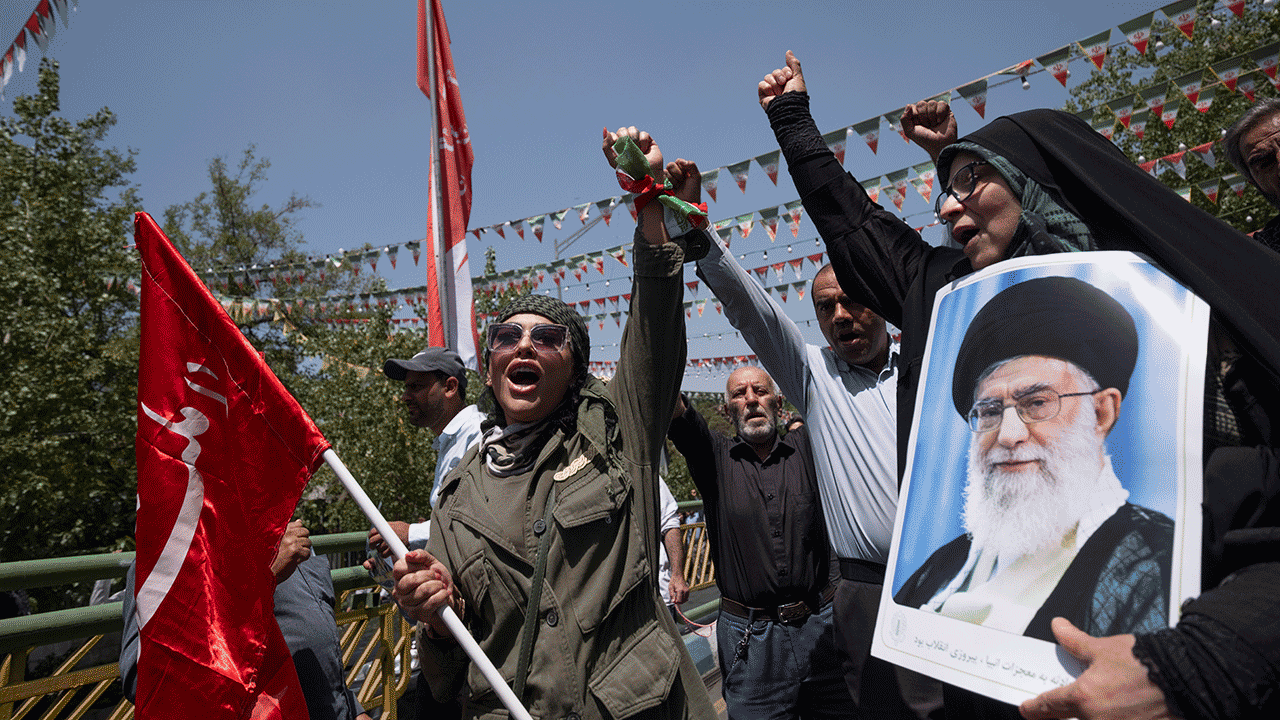
Iranian worshippers shout anti-U.S. and anti-Israeli slogans as one of them holds a portrait of Iran’s Supreme Leader, Ayatollah Ali Khamenei, during an anti-Israeli rally to condemn Israeli attacks on Iran, after Tehran’s Friday prayers in Tehran, Iran, on June 20, 2025. (Photo by Morteza Nikoubazl/NurPhoto via Getty Images)
IRAN VOWS RETALIATION IF UN SECURITY COUNCIL ISSUES SNAPBACK SANCTIONS ON ANNIVERSARY OF NUCLEAR DEAL
Iran said that the U.S. needs to rejoin the 2015 nuclear deal – after President Trump pulled America out of it in 2018 – saying Iran has «absolutely no trust in the United States.»
The U.S. bombed Iran’s nuclear sites on June 22, a little over a week after Israel had bombed the country over national security concerns about its nuclear program.
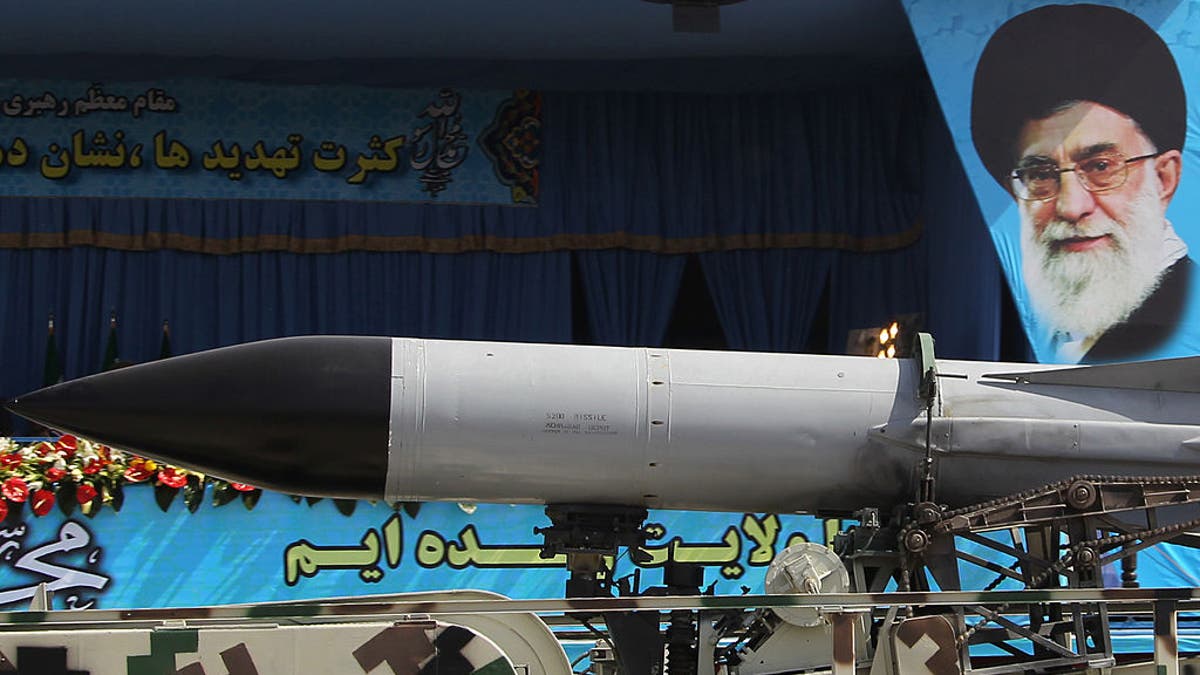
A military truck carries a missile past a portrait of Iran’s Supreme Leader Ayatollah Ali Khamenei during an annual military parade. (ATTA KENARE/AFP/GettyImages))
Iran responded by attacking Israel and a U.S. Army base in Qatar.
Isreal and Iran agreed to a ceasefire on June 24.
CLICK HERE TO GET THE FOX NEWS APP
The IAEA issued a concerning report in May that said that Iran’s stockpile of near-weapons-grade enriched uranium had grown by nearly 50% in three months.
The Associated Press contributed to this report.
INTERNACIONAL
¿Guerra en el Sudeste asiático? Las claves de los enfrentamientos mortales entre Tailandia y Camboya, enemigos históricos
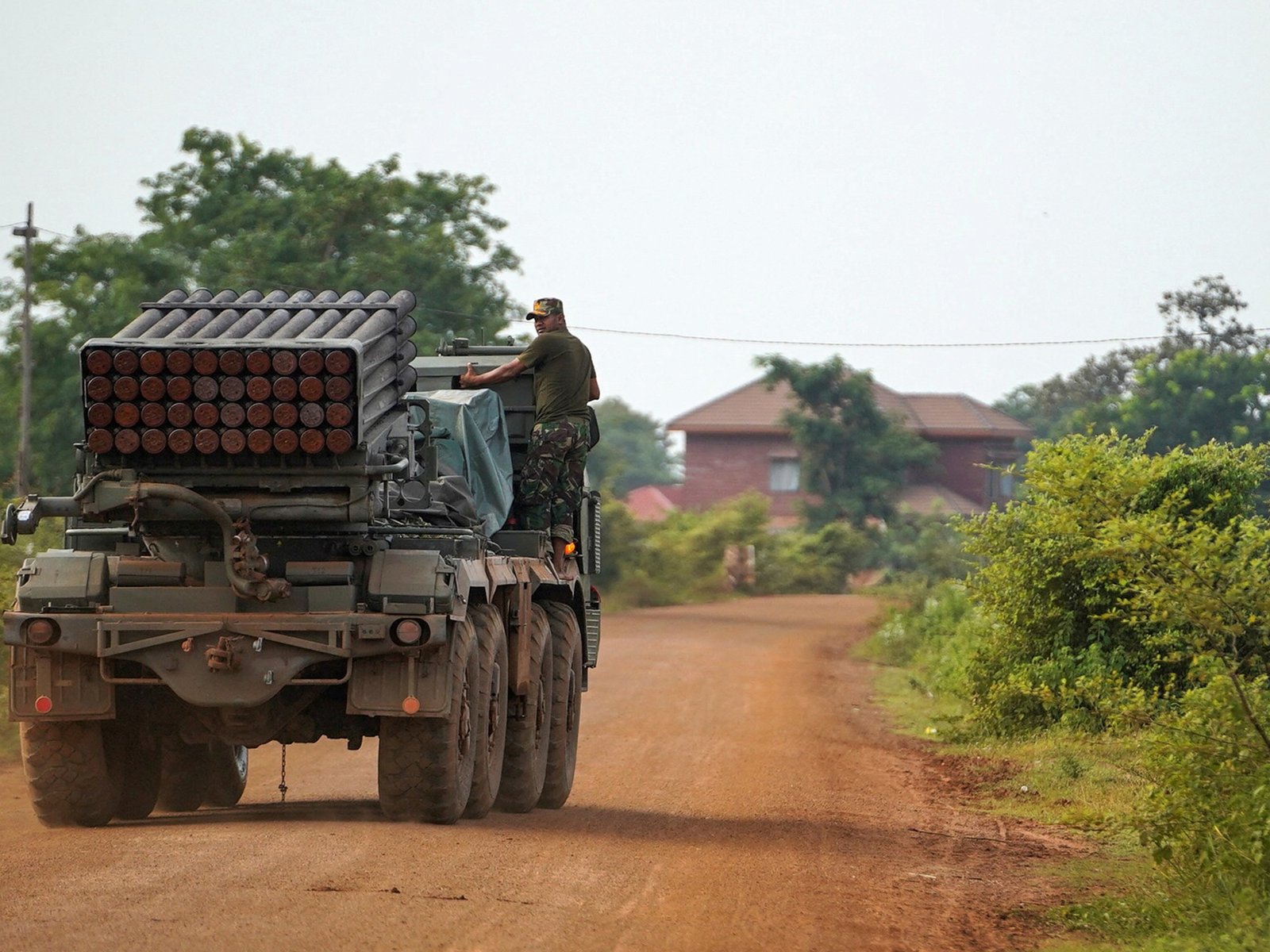
Una nueva guerra en un mundo poblado de conflictos, con profundas raíces hostiles de hace siglos entre Tailandia y Camboya, se perfila en el sudeste asiático. Para este viernes fue convocado de urgencia el Consejo de Seguridad de las Naciones Unidas para tratar de evitar un estallido en una zona delicada del mundo, cada vez más inestable por la difusión de guerras locales.
Tailandia ordenó evacuar más de cien mil nacionales de la frontera en conflicto, de ochocientos kilómetros, y se han producido los primeros choques por incursiones camboyanas, con un saldo de catorce muertos. Y es solo el comienzo.
En Roma se están juntando más de un millón de jóvenes para celebrar desde el lunes 28 hasta el 3 de agosto el Jubileo Mundial del Año 2025 dedicado a la Juventud bajo la popular consigna de dar “un grito contra la guerra”, que sería conmovido por un abierto conflicto entre Tailandia y Camboya.
En ambos países el poder militar es determinante en el gobierno del país desde hace muchos años. Tailandia, con 71 millones de habitantes distribuidos en 53.000 kilómetros cuadrados de territorio es predominante sobre Camboya, con 17 millones de habitantes repartidos en 181 mil kilómetros cuadrados y un fuerte aparto militar bien entrenado.
En el siglo XX, Francia, la potencia colonial, diseñó en 1907 los confines entre Camboya y el reino de Siam, la actual Tailandia, asignando una buena parte a los camboyanos. Hasta 1953 Francia ocupó Indochina. Las fronteras nunca fueron aceptadas por los dos países y hasta hoy se prolongan los choques armados.
El jueves los ataques principales los lanzó Camboya y Tailandia ordenó la evacuación y respondió con incursiones aéreas. Los sentimientos nacionalistas aumentan los odios mutuos. Pero también la lucha se exalta con la religión, en la lucha por la posesión de los numerosos templos budistas e hinduistas, que se remontan a muchos siglos y están parcialmente en ruinas, aunque son de una gran belleza y valor arquitectónica, además de su importancia religiosa.
Ya en mayo pasado la crisis había escalado, con la muerte de un soldado camboyano y las graves heridas de un militar tailandés tras pisar una mina en el confín de Chong Bok.
El premier thailandés Phumtham Wechayachai acusó a Camboya de colocar nuevas minas en la vasta área en contienda. Los camboyanos rechazaron las protestas, advirtiendo que el gobierno de Phnom Penh, la capital, defenderá la integridad territorial “en cualquier circunstancia y a cualquier costo”
En los dos países el poder militar respalda el “no pasarán”. En 2011 los choques causaron treinta muertos. Todos saben que si los enfrentamientos no son controlados la violencia se derramará en toda la frontera.
Tailandia demuestra el ulterior deterioro de las relaciones bilaterales rebajando “al nivel más bajo” las relaciones diplomáticas. Su gobierno llamó al embajador en la capital de Camboya y echó del país al embajador camboyano.
Hace dos meses que la situación va precipitando, con controles fronterizos intensificados. Tailandia ha cerrado muchos pasos con su potencial enemigo, con represalias camboyanas inmediatas. Camboya anunció que se implanta la extensión del servicio militar obligatorio desde enero de 2026.
Camboya ha prohibido la importación de fruta y verdura. También de combustible, desde Tailandia. Ambos países han reducido la duración de los permisos de residencia mutuos.
Las medidas continuas que atacan la convivencia a través de las frontera, se han intensificado en los últimos meses también en zonas donde hasta ahora no hubo enfrentamientos.
Estados Unidos se ha limitado a hacer llamados a los dos países para negociar una convivencia pacífica, pero no se muestra decidido a una mediación que, por otra parte, no le han pedido ni Tailandia ni Camboya.
La crisis progresiva repercute en la política interna de los contendientes. El gobierno tailandés ha sido acusado por la oposición y sectores de las mismas fuerzas de la mayoría, pidiendo la dimisión de la premier.
Lo mismo ocurre en Camboya, que además se ha apelado en el reciente pasado a la Corte Internacional de Justicia para resolver las controversias sobre las fronteras.
Tailandia no acepta la jurisdicción de la Corte y prefiere resolver las cuestiones “a través de negociaciones directas”, que muchas veces no dan resultado y llevan a enfrentamientos directos, que esta vez tienen una perspectiva muy grave.

 POLITICA2 días ago
POLITICA2 días agoMáximo Kirchner declaró una fortuna de 8.300 millones de pesos: representa un 76% más que el año anterior

 POLITICA1 día ago
POLITICA1 día agoLa justicia de Santa Cruz desafío a la Corte Suprema e incluyó a Cristina Kirchner en el padrón electoral

 POLITICA2 días ago
POLITICA2 días agoQué dijo Javier Milei en la Derecha Fest: las frases más impactantes
















